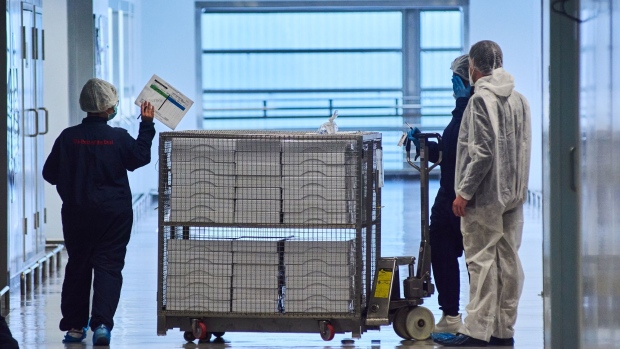Jan 21, 2022
Less-Threatening Omicron Lowers Covid Vaccine Sales Estimate
, Bloomberg News

(Bloomberg) -- Evidence that omicron causes less-severe disease than earlier Covid-19 variants will likely blunt growth in vaccine sales this year as wealthier countries rein in purchases, according to Airfinity Ltd.
Sales of Covid vaccines, excluding those from China and India, will increase to about $85 billion in 2022, down about 28% from an earlier estimate of $118 billion, London-based Airfinity said Friday. The revision was also due to lower prices paid by poorer nations that are finally obtaining shots, the analytics firm said.
Omicron has spread rapidly around the world but appears less likely to cause hospitalizations and deaths than predecessors such as delta, which the new variant displaced in just weeks. While health experts warn that the global crisis isn’t over and significant risks remain, optimism for a pandemic reprieve is likely to limit richer countries’ vaccine purchases, Airfinity said in a statement.
Demand for doses is still rising, and booster programs in high-income countries will be a key driver, according to Airfinity, which estimates that sales will climb almost 30% in 2022 from about $66 billion last year. In a Bloomberg TV interview last week, Moderna Inc. Chief Executive Officer Stephane Bancel said he expected another Covid booster shot would be needed in the fall.
Moderna could record about $26 billion in sales this year, while Pfizer Inc. and German partner BioNTech SE may reel in about $43 billion, Airfinity estimates. AstraZeneca Plc is expected to generate $4.3 billion in vaccine revenue, Airfinity said.
Those estimates differ from those of the drugmakers themselves. Pfizer has forecast $31 billion in 2022 Covid vaccine sales. Moderna said Jan. 10 that it expects vaccine sales of $18.5 billion along with a potential $3.5 billion from boosters and other purchases. Airfinity took existing contracts into account, according to Matt Linley, a lead analyst, and its estimates mainly apply to how factors such as omicron’s severity will affect additional purchases this year.
Many people in lower- and middle-income countries remain unvaccinated, keeping demand high in some regions. While two-thirds of people in wealthy countries had received at least one dose as of last week, just 11% in low-income nations had.
Health officials and scientists have said it’s too soon to say whether Covid is shifting to becoming a persistent, endemic illness like the flu, adding that variants continue to pose a risk. There’s no guarantee Covid will keep trending toward less-severe disease, and big health foundations are funding efforts to help prepare for emerging variants.
Yet omicron may cool demand in wealthier nations, while doses are sold at reduced prices in poorer regions. Countries that are able to provide fourth doses are likely to focus on more vulnerable groups rather than the broader population, Linley said.
©2022 Bloomberg L.P.